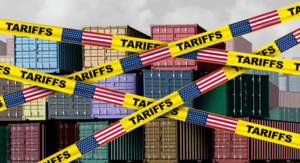
The IMF Surcharge Policy Must Be End
The IMF surcharge policy must end, as it unfairly burdens financially distressed countries like Pakistan and Ukraine. These nations, already grappling with economic crises, are forced to pay excessive fees that further strain their limited resources.
Instead of promoting financial stability, surcharges make it harder for countries to recover by increasing their debt load when they can least afford it. With the IMF’s financial reserves now robust, continuing this policy only hinders global recovery efforts. Ending or reforming surcharges would alleviate unnecessary pressure, allowing countries to focus on rebuilding their economies and meeting global development goals.
Why The IMF Surcharge Policy Must End?
The IMF surcharge policy has become a controversial issue, particularly as it imposes additional financial burdens on some of the world’s most distressed economies, including war-torn Ukraine and climate-stricken Pakistan. These surcharges, which are meant to penalize countries for exceeding borrowing limits, have sparked widespread criticism. The policy undermines the very goals of the IMF by exacerbating the financial woes of debtor nations.
Read More: The Impact of Chinese Manufacturing Decline
Table of Contents
1. The Surcharge Policy Burdens Financially Distressed Countries
The International Monetary Fund (IMF) was created to provide stability to the global financial system by lending to countries in economic distress. However, the IMF surcharge policy does the opposite by placing additional financial pressure on already struggling economies.
A group of 22 financially distressed countries, including Pakistan and Ukraine, has become the largest source of net revenue for the IMF in recent years. These countries, reeling from crises like war, climate disasters, and the COVID-19 pandemic, are forced to make extra payments to the IMF—payments that exceed the Fund’s operating costs.
By placing this additional burden on nations that are barely able to pay their own bills, the IMF surcharge policy contravenes the very mission of the Fund. These countries should not be penalized for seeking financial assistance; instead, they should be supported through counter-cyclical financing that helps them stabilize their economies, rather than pushing them deeper into debt.
Read More: The Geopolitics of Olympic Medals (Paris Olympic Games, 2024)
2. Surcharges Do Not Ensure Repayment or Strengthen IMF Finances
A key argument in favor of the IMF surcharge policy is that it helps protect the Fund’s finances and ensures debtor countries repay their loans. However, this rationale is deeply flawed. Surcharges neither guarantee repayment nor serve to protect the IMF’s financial health.
Instead, they increase the debt burden on countries when they can least afford it, undermining their economic recovery efforts.
The IMF’s basic interest rate has increased from under 1% in 2020 to nearly 5% by 2023, making the total lending rate for countries subject to surcharges as high as 7.8%. This creates an unbearable financial strain for countries already experiencing economic crises.
The IMF surcharge policy, rather than safeguarding its finances, may hinder countries’ ability to repay, trapping them in a cycle of debt.
Read More: The Economics of Techno-Colonialism
3. Surcharges Exacerbate Dependence on IMF Lending
The IMF surcharge policy is meant to discourage countries from borrowing excessively, but in reality, it makes nations more dependent on the Fund. Critics of the policy point out that the additional fees increase the financial burden on these countries, making it harder for them to exit their debt traps.
Since the IMF is a preferred creditor, countries must prioritize repaying their IMF loans over other creditors, putting even more pressure on their limited foreign-exchange reserves.
For countries like Ukraine and Pakistan, this means diverting scarce foreign currency to repay the IMF rather than rebuilding their economies or accessing global credit markets.
As long as the IMF surcharge policy remains in place, these nations will find it difficult to break free from financial dependency on the Fund, perpetuating a cycle of indebtedness.
4. The Surcharge Policy is Pro-Cyclical, Not Counter-Cyclical
The IMF was established to provide counter-cyclical financing—that is, financial support that helps stabilize economies during downturns. However, the surcharge policy operates in a pro-cyclical manner, imposing additional fees on countries precisely when they are most vulnerable. External factors such as rising interest rates, commodity price shocks, or natural disasters often force countries to borrow heavily from the IMF. As these countries struggle to recover, surcharges only worsen their financial condition.
For example, during the COVID-19 pandemic and the Ukraine war, many countries borrowed more from the IMF due to external shocks. Rather than being given room to recover, these countries faced surcharges that added to their debt burdens. This is counterproductive and undermines the IMF’s objective of promoting stable growth.
Read More: A New Economics Of Industrial Policy
5. The IMF’s Financial Buffers Do Not Justify the Surcharge Policy
One justification for the IMF surcharge policy is that the additional fees help build the Fund’s financial buffers. These buffers are intended to protect the IMF in case of borrower defaults. However, this argument no longer holds water. Defaults by IMF borrowers are extremely rare, and the IMF is already on track to meet its medium-term target for precautionary balances.
The reality is that the surcharge policy now primarily takes money from indebted middle-income countries to run the IMF, reducing the financial burden on wealthy countries. This is fundamentally at odds with the IMF’s mission to promote financial stability and global economic growth.
Given the pressing need for investment in sustainable development goals and climate change initiatives, countries like Pakistan and Ukraine should not be forced to finance the IMF at the expense of their own development.
6. Reform is Possible: The IMF Can Take a Different Path
The IMF has recently launched a review of its surcharge policy, signaling an opportunity for reform. Various global leaders and organizations, including the G24 group of developing countries and prominent voices like Barbadian Prime Minister Mia Amor Mottley, have called for an end to the surcharge policy. Reforming this policy would help align the IMF’s actions with its mission of global financial stability.
The simplest and most effective solution would be to eliminate the surcharges entirely. If that proves politically unfeasible, other reforms could include capping total interest charges or raising the thresholds for when surcharges are applied.
The IMF could also count surcharge payments as part of a country’s principal repayment, easing the debt burden while still maintaining financial discipline.
Bottom Line
The IMF surcharge policy has evolved into a counterproductive mechanism that punishes countries precisely when they need support the most. It neither ensures repayment nor protects the IMF’s finances. Instead, it exacerbates debt dependency, places undue burdens on economically fragile nations, and undermines the very mission of the IMF.
The global financial landscape is already fraught with challenges from war, climate change, and rising interest rates; piling on surcharges only serves to deepen these crises. The time has come for the IMF to end its surcharge policy and embrace a more equitable approach to lending that truly promotes global financial stability.





